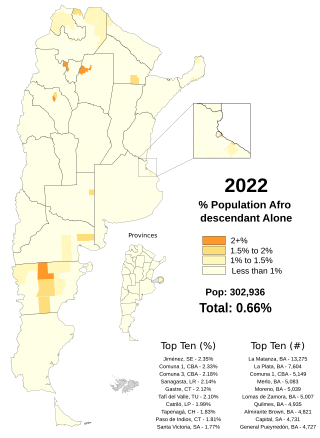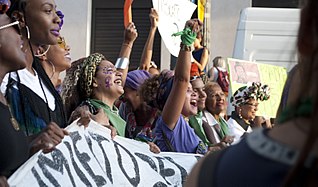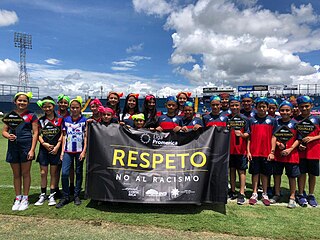Related Research Articles

Limón is one of seven provinces in Costa Rica. The province covers an area of 9,189 km2, and has a population of 386,862.

Jeaustin Campos Madriz is a Costa Rican football manager and retired player.

Afro-Argentines, are Argentines who have predominantly or total Sub-Saharan African ancestry. The Afro-Argentine population is the result of people being brought over during the transatlantic slave trade during the centuries of Spanish domination in the region and immigration from Africa.
Racism in Portugal has a long history, including the early modern persecution of Muslims and Jews and Portugal's involvement in the trade in enslaved people from West Africa.
The continent of South America is culturally and racially diverse. This article examines by country and region the current and historical trends in race relations and racism within South America. Racism of various forms is to be found worldwide. Racism is widely condemned throughout the world, with 170 states signatories of the International Convention on the Elimination of All Forms of Racial Discrimination by August 8, 2006. In different countries, the forms that racism takes may be different for historic, cultural, religious, economic or demographic reasons.

Epsy Alejandra Campbell Barr is a Costa Rican politician and economist who served as the Vice-president of Costa Rica from 8 May 2018 to 8 May 2022. She is the first woman of African descent to be vice president in Costa Rica and in Latin America.
The African diaspora in the Americas refers to the people born in the Americas with partial, predominant, or complete sub-Saharan African ancestry. Many are descendants of persons enslaved in Africa and transferred to the Americas by Europeans, then forced to work mostly in European-owned mines and plantations, between the sixteenth and nineteenth centuries. Significant groups have been established in the United States, in Canada, in the Caribbean (Afro-Caribbean), and in Latin America.

Cahuita is a district of the Talamanca canton, in the Limón province of Costa Rica. It is located on the Caribbean coast.
Historically, Puerto Rico, which is now an unincorporated territory of the U.S., has been dominated by a settler society of religiously and ethnically diverse Europeans, primarily of Spanish descent, and Sub-Saharan Africans. The majority of Puerto Ricans are multi-ethnic, including people of European, African, Asian, Native American, and of mixed-ethnic descent.
Racism in Mexico refers to the social phenomenon in which behaviors of discrimination, prejudice, and any form of antagonism are directed against people in that country due to their race, ethnicity, skin color, language, or physical complexion. It may also refer to the treatment and sense of superiority of one race over another.
The Law Against Racism and All Forms of Discrimination is a statute passed by the Plurinational Legislative Assembly of Bolivia as Law 045 and promulgated by President Evo Morales into law as Law 737/2010 on 10 October 2010. The law prohibits discrimination and discriminatory aggression by public and private institutions and individuals, creates a governmental Committee Against Racism and All Forms of Discrimination, and bars the dissemination of racist and discriminatory ideas through the mass media. The provisions of the law applying to the media caused extensive controversy and were opposed by mainstream publications and media worker associations.

Intersex people in Argentina have no recognition of their rights to physical integrity and bodily autonomy, and no specific protections from discrimination on the basis of sex characteristics. Cases also exist of children being denied access to birth certificates without their parents consenting to medical interventions. The National Institute Against Discrimination, Xenophobia and Racism and civil society organizations such as Justicia Intersex have called for the prohibition of unnecessary medical interventions and access to redress.

Esther Pineda G., often published as Esther Pineda, is a Venezuelan sociologist and feminist writer. She has written sociological studies, essay collections, and poetic anthologies about misogyny in the history of Western philosophy, the connection between machismo and violence against women, and racial discrimination, particularly against Afro-Venezuelans. Pineda holds a PhD in sociology, and her writing frequently uses tools of sociological analysis.
Racism in Chile encompasses any type of racial or ethnic discrimination by a group of inhabitants or organizations of that country against groups from other nations or the same nation. The origins of Chilean racism, and that of other Latin American nations, can be traced back to 16th century colonialism under the rule of the Spanish Empire. In the establishment of imperial rule, Native Americans experienced extermination, slavery and forced miscegenation.
María Reinat-Pumarejo is a Puerto Rican peace and anti-racism activist.

Thelma Darkings Bucknam is a Costa Rican actress and television presenter. She is known for hosting the Costa Rican talk show programs Conectados and previously Entre nos. Her film credits include Noi siamo angeli (1997), Caribe (2004), and El último comandante (2010).
María Magdalena "Pocha" Lamadrid was an Afro-Argentine activist and campaigner. She was the founder of the NGO África Vive, and was a pioneer activist of the Afro-Argentine community.
Racism in Peru comprises negative attitudes and views on race or ethnicity which are related to each other, are held by various people and groups in Peru, and have been reflected in discriminatory laws, practices and actions at various times in the history of Peru against racial or ethnic groups. Peruvian intellectuals, who were mainly white and based in the developed capital city of Lima, historically denied that racism existed in Peru and did not focus on the social issue, often participating in racism themselves. The concentration of wealth amongst elites in Lima through centralismo resulted with a history of systemic racism in Peru, with individuals in Lima basing their discrimination against rural individuals due to race and geographical location.

The International Day of Black Latin American and Caribbean Women, shortly known as B.L.A.C Women's Day, also known as the International Afro-Latin American, Afro-Caribbean and Diaspora Women's Day and International Afro-descendant Women's Day, is linked to Afrofeminism movement and the broader recognition of the African diaspora and the rights of people of African descent that observed on 25 July since 1992.

"Respect. No to racism" is an anti-racist, anti-discrimination, and tolerance-promoting campaign in Costa Rica's sports events, particularly in the football matches of the Liga FPD. The campaign aims to foster the integration of values in sports environments, with a primary focus on respect.
References
- 1 2 "Global Forum against Racism and Discrimination 2023". Unesco. Archived from the original on 2023-12-28. Retrieved 2023-11-30.
- ↑ "Oficina realizó evento sobre incidencia y desarrollo de personas afrodescendientes en América Latina y el Caribe – ACNUDH" (in European Spanish). Archived from the original on 2023-12-01. Retrieved 2023-12-01.
- ↑ "Lanzan en Costa Rica Coalición contra el Racismo Sistémico y por las Reparaciones". Elpais.cr. 2021-09-03. Archived from the original on 2023-12-01. Retrieved 2023-11-30.
- ↑ "Conmemoración global de afrodescendientes finaliza con anuncio de lanzamiento de Coalición contra el Racismo Sistémico y por las Reparaciones". Presidencia de la República de Costa Rica (in Spanish). 2021-09-03. Archived from the original on 2023-12-01. Retrieved 2023-12-01.
- ↑ Comunicación Institucional (2021-09-01). "Costa Rica lidera conmemoración del Día Internacional de las Personas Afrodescendientes". Ministerio de Relaciones Exteriores y Culto (in Spanish). Archived from the original on 2023-12-01. Retrieved 2023-11-30.
- ↑ Feagin, Joe R. (2006). Systemic racism: a theory of oppression. London: Routledge. ISBN 978-0-415-95278-1.
- ↑ "Definición de Racismo Sistemático en Sociología..." Anthropology and Practice (in Spanish). 2018-02-21. Archived from the original on 2023-12-01. Retrieved 2023-12-01.
- ↑ Aparici, Roberto; Marín, David García (2019-01-31). La posverdad: Una cartografía de los medios, las redes y la política (in Spanish). Editorial GEDISA. ISBN 978-84-17690-50-2. Archived from the original on 2023-12-03. Retrieved 2023-12-03.
- ↑ Buraschi, Daniel; Idáñez, María José Aguilar (2021-03-20). "Racismo institucional: ¿De qué estamos hablando?". The Conversation. Archived from the original on 2023-12-01. Retrieved 2023-12-01.
- ↑ "Systemic Racism vs. Institutional Racism" (PDF). Out of Africa Monologue Series. 2020-11-30. Archived (PDF) from the original on 2023-11-28. Retrieved 2023-12-03.
- ↑ "Systemic Racism". Fair Fight Initiative. Archived from the original on 2023-12-01. Retrieved 2023-12-01.
- ↑ "Costa Rica llama a cumplir promesas de igualdad, justicia y reconocimiento para las personas afrodescendientes". Ministerio de Relaciones Exteriores y Culto (in Spanish). 2021-07-22. Archived from the original on 2023-11-28. Retrieved 2023-11-30.
- ↑ "Remembering so as not to Repeat: Sowing the Future of Dignity for Afro-descendants". UN Women – Multi-Country Office – Caribbean. 2023-08-23. Archived from the original on 2023-12-01. Retrieved 2023-12-01.
- ↑ "Firman en Congreso de Guerrero convenio contra el racismo sistémico". Quadratín Guerrero (in Mexican Spanish). 2023-09-08. Archived from the original on 2023-12-01. Retrieved 2023-12-01.
- 1 2 3 4 5 6 7 8 9 Rangel, Luz (2022-12-17). "El liderazgo de las mujeres afrodescendientes responde a las necesidades de su propia vida: Epsy Campbell Barr". La Lista (in Mexican Spanish). Archived from the original on 2023-12-01. Retrieved 2023-12-01.
- ↑ Noticias, T. V. N. (2022-12-01). "Panameños destacan en Foro Global contra el Racismo y la Discriminación" (in Spanish). Archived from the original on 2023-12-01. Retrieved 2023-12-01.
- ↑ Ruiz, Maria Fernanda (2022-11-30). "Unesco y aliados unen esfuerzos para combatir racismo y discriminación a nivel global • Once Noticias". Once Noticias (in Mexican Spanish). Archived from the original on 2023-12-01. Retrieved 2023-12-01.
- ↑ "Cahuita será sede del concierto internacional contra el racismo este 8 de marzo". Digital506 (in Spanish). 2023-02-23. Archived from the original on 2023-12-01. Retrieved 2023-12-01.
- ↑ "Primer Concierto Internacional contra el Racismo llega a Limón este 8 de marzo". delfino.cr (in Spanish). Retrieved 2023-12-01.
- ↑ "Atividades apoiadas pelo UNFPA marcam o calendário de homenagens às mulheres negras em Salvador". UNFPA Brasil. 2023-08-02. Retrieved 2023-12-01.
- ↑ "BA | Festival Latinidades". Archived from the original on 2023-11-29. Retrieved 2023-12-01.
- ↑ "Dia Internacional da Mulher Negra Latino-americana e Caribenha tem marchas em todo o país; veja". Brasil de Fato (in Brazilian Portuguese). 2023-07-25. Archived from the original on 2023-12-03. Retrieved 2023-12-01.
- ↑ iBahia (2023-07-28). "Salvador recebe 'Festival Latinidades 2023' neste final de semana". iBahia (in Brazilian Portuguese). Archived from the original on 2023-12-03. Retrieved 2023-12-01.
- ↑ "Saprissa anuncia destitución de Jeaustin Campos tras comentarios racistas contra jugador Javon East". delfino.cr (in Spanish). Archived from the original on 2023-11-28. Retrieved 2023-12-01.
- ↑ "Comité de Ética impone fuerte castigo a Jeaustin Campos". La Nación (in Spanish). 2023-11-27. Archived from the original on 2023-11-30. Retrieved 2023-12-01.
- ↑ "Herediano toma decisión sorpresiva con Jeaustin Campos". La Nación (in Spanish). 2023-11-28. Archived from the original on 2023-12-01. Retrieved 2023-12-01.
- ↑ "Jeaustin Campos ya no es técnico del Herediano". Teletica (in European Spanish). 2023-11-28. Retrieved 2023-12-01.